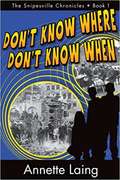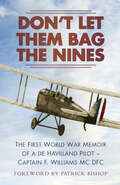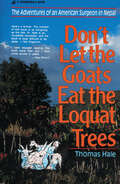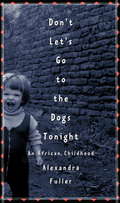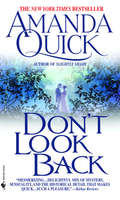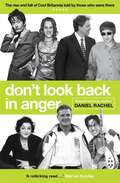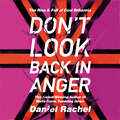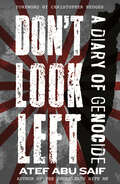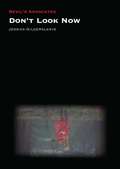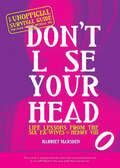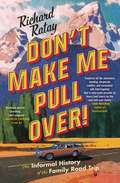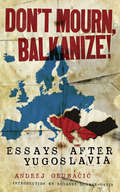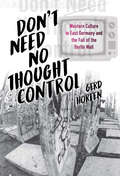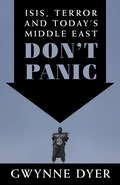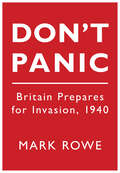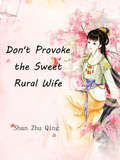- Table View
- List View
Don't Know Where, Don't Know When (The Snipesville Chronicles #1)
by Annette Laing<p>The first book in The Snipesville Chronicles series, thought-provoking and engaging novels for young readers in the times in which we now live, written by a real historian. <p>Hannah Dias, California Girl with Attitude, and Alex, her laid-back brother, move from exciting San Francisco to boring Snipesville, Georgia, and things don't improve when they meet Brandon, a dorky kid who is plotting his escape from the Deep South, and the weird Professor, a woman with a strange secret <p>Suddenly, Hannah, Alex, and Brandon are catapulted thousands of miles and almost seventy years to England during World War Two. <p>They fall into a world of stinging nettles, dragon ladies, bomb blasts, ugly underwear, stinky sandwiches, and painful punishments. <p>But they can't go home unless they find George Braithwaite, whoever he is, and whatever it is that he has to do with Snipesville. <p>Don't Know Where, Don't Know When is the first installment of The Snipesville Chronicles, a historical fiction series by a real historian.</p>
Don't Let Them Bag the Nines: The First World War Memoir of a de Havilland Pilot - Captain F. Williams MC DFC
by Patrick Bishop F. WilliamsUndisturbed in an old First World War trunk were medals, logbooks, plane parts . . . and an old manuscript. This was the memoir of Captain Frederick Williams, who flew D.H.4s in photo reconnaissance and bomber raids over Germany. Starting when he was stationed in Nancy in 1918 and ending with his return home with a Croix de Guerre and a DFC to his name, Captain Williams’ vivid descriptions place the reader right in the air alongside him, relaying the thoughts running through his head as events unfolded around him. It is an important insight into the early development of bomber raids within the RAF.
Don't Let the Goats Eat the Loquat Trees: The Adventures of an American Surgeon in Nepal
by Thomas HaleThomas Hale writes about being a missionary surgeon in the same delightful way James Herriot writes about being a country veterinarian. Dr. Hale's incredible experience in tiny, mountainous Nepal are surpassed only by his talent for telling about them. Imagine, for example, the culture shock of moving to a Hindu country under such rigid religious control that it is not only illegal to proselytize, but illegal to change religions as well. Imagine further the shock of moving to that country as a missionary doctor. Thomas Hale and his wife, Cynthia, also a physician, too on that awesome challenge in 1970.God wasted no time teaching tom the peculiarities of his new culture. But His unusual method left Tom wondering what God was up to. Here is how Tom tells about it:"These were not the phlegmatic, easy-going Nepalis described in books and orientation courses. Those who spoke gesticulated fiercely. Some looked around menacingly; others spat. One thing was certain, however: in the cause of their anger they were united. The word was out: the new doctor had killed a cow. My own sense of participation in the proceedings was intense. I was the new doctor."--ExcerptAs Tom goes on to describe the events the preceded the angry scene in the Nepali village, the image of the spiritually superior missionary quickly evaporates. In a humorous, yet deeply insightful way, the author makes it clear that he is merely a servant, using his skills to the glory of God.Tom concludes this chapter with a thoughtful confession:"In the long run, that cow did much more for me that I did for it. The mild-mannered, uncritical beast made me see in myself those negative attributes I had always ascribed to other American surgeons. Facing two hundred angry men proved to be effective therapy for removing most traces of condescension with which I previously regarded them. It also improved my relations with missionary colleagues and with Nepali brothers and sisters in the church. I guess God had no gentler way of removing some of my imperfections. I only wish I could say, for His trouble, that He finished the job. But it was a start." -- Excerpt.Dr. Hale's book refused to be preachy or condescending. It presents missions as a "want" rather than an "ought." It is sensitive, warm, honest, incredibly funny, and filled with important truths illustrated from unusual and sometimes unimaginable situations.
Don't Let's Go to the Dogs Tonight: An African Childhood (Picador Classic Ser. #11)
by Alexandra FullerNEW YORK TIMES BESTSELLER * ENTERTAINMENT WEEKLY'S #1 NONFICTION BOOK OF THE YEAR * A NEW YORK TIMES NOTABLE BOOK * FINALIST, GUARDIAN FIRST BOOK PRIZE "This is not a book you read just once, but a tale of terrible beauty to get lost in over and over."--Newsweek "By turns mischievous and openhearted, earthy and soaring . . . hair-raising, horrific, and thrilling."--The New Yorker In Don't Let's Go to the Dogs Tonight, Alexandra Fuller remembers her African childhood with visceral authenticity. Though it is a diary of an unruly life in an often inhospitable place, it is suffused with Fuller's endearing ability to find laughter, even when there is little to celebrate. Fuller's debut is unsentimental and unflinching but always captivating. In wry and sometimes hilarious prose, she stares down disaster and looks back with rage and love at the life of an extraordinary family in an extraordinary time. From 1972 to 1990, Alexandra Fuller--known to friends and family as Bobo--grew up on several farms in southern and central Africa. Her father joined up on the side of the white government in the Rhodesian civil war, and was often away fighting against the powerful black guerilla factions. Her mother, in turn, flung herself at their African life and its rugged farm work with the same passion and maniacal energy she brought to everything else. Though she loved her children, she was no hand-holder and had little tolerance for neediness. She nurtured her daughters in other ways: She taught them, by example, to be resilient and self-sufficient, to have strong wills and strong opinions, and to embrace life wholeheartedly, despite and because of difficult circumstances. And she instilled in Bobo, particularly, a love of reading and of storytelling that proved to be her salvation. A worthy heir to Isak Dinesen and Beryl Markham, Alexandra Fuller writes poignantly about a girl becoming a woman and a writer against a backdrop of unrest, not just in her country but in her home. But Don't Let's Go to the Dogs Tonight is more than a survivor's story. It is the story of one woman's unbreakable bond with a continent and the people who inhabit it, a portrait lovingly realized and deeply felt.Praise for Don't Let's Go to the Dogs Tonight "The Africa of this beautiful book is not easy to forget. Despite, or maybe even because of, the snakes, the leopards, the malaria and the sheer craziness of its human inhabitants, often violent but pulsing with life, it seems like a fine place to grow up, at least if you are as strong, passionate, sharp and gifted as Alexandra Fuller."--Chicago Tribune "Owning a great story doesn't guarantee being able to tell it well. That's the individual mystery of talent, a gift with which Alexandra Fuller is richly blessed, and with which she illuminates her extraordinary memoir. . . . There's flavor, aroma, humor, patience . . . and pinpoint observational acuity."--Entertainment Weekly "This is a joyously telling memoir that evokes Mary Karr's The Liars' Club as much as it does Isak Dinesen's Out of Africa."--New York Daily News "Riveting . . . [full of] humor and compassion."--O: The Oprah Magazine "The incredible story of an incredible childhood."--The Providence JournalFrom the Hardcover edition.
Don't Look Back (Lake & March #2)
by Amanda QuickAs if a head for business and a nose for trouble aren't enough to distinguish fiercely independent Lavinia Lake from the other women of London's fashionable Claremont Lane, there is one more feature to set her apart. <P><P>Lavinia is also well versed in the practice of mesmerism, an extraordinary gift that far surpasses mere charm and physical appeal. Nobody knows this better than the usually coolheaded Tobias March, who seems to have fallen hopelessly under her spell. Fortunately for all, however, Lavinia uses her powers for good. And ever since a tragedy involving one of her subjects, she has even retired them in favor of her work with Lake and March, a joint venture providing "discreet private inquiries for individuals of quality. " Celeste Hudson, the stunningly beautiful young wife of a family friend and fellow mesmerist, would surely count herself among such individuals--were she still alive, that is. While mythology's Medusa could turn men to stone, lovely Celeste was more accustomed to turning them to jelly. In fact, unbeknownst to her husband, Howard, the ambitious Celeste was planning to use her talents to forge a new future in Society--one that would not include him. Sadly, her plans were cut short when she was murdered. Only a gentleman's cravat wound around her lovely neck remained for evidence--small compensation for the strange and priceless bracelet that may have been snatched from her wrist as she drew her last breath. As a result, Lake and March are soon in Howard Hudson's employ on the trail of the killer. But Tobias is convinced the dashing widower is more interested in tracking down the missing relic. If so, Howard is not alone. Any number of ruthless types are after the very same antiquity, whose centerpiece is an unusual blue cameo of inestimable value and supposed legendary powers--powers of immeasurable worth to anyone in Howard's line of work. Together, Lake and March undertake a tantalizing investigation that leads them from the glittering ballrooms of the ton to London's seediest taverns to a mesmerist whose therapies include treating ladies suffering from "hysteria" is a a most unconventional method--and, not least of all, to the darkest reaches of men's psyches. Along the way, DON'T LOOK BACK becomes a completely mesmerizing read as the irrepressible Lavinia and Tobias mix business with pleasure. . . .
Don't Look Back In Anger: The rise and fall of Cool Britannia, told by those who were there
by Daniel RachelThe nineties was the decade when British culture reclaimed its position at the artistic centre of the world. Not since the 'Swinging Sixties' had art, comedy, fashion, film, football, literature and music interwoven into a blooming of national self-confidence. It was the decade of Lad Culture and Girl Power; of Blur vs Oasis. When fashion runways shone with British talent, Young British Artists became household names, football was 'coming home' and British film went worldwide. From Old Labour's defeat in 1992 through to New Labour's historic landslide in 1997, Don't Look Back In Anger chronicles the Cool Britannia age when the country united through a resurgence of patriotism and a celebration of all things British. But it was also an era of false promises and misplaced trust, when the weight of substance was based on the airlessness of branding, spin and the first stirrings of celebrity culture. A decade that started with hope then ended with the death of the 'people's princess' and 9/11 - an event that redefined a new world order. Through sixty-eight voices that epitomise the decade - including Tony Blair, John Major, Noel Gallagher, Damon Albarn, Tracey Emin, Keith Allen, Meera Syal, David Baddiel, Irvine Welsh and Steve Coogan - we re-live the epic highs and crashing lows of one of the most eventful periods in British history. Today, in an age where identity dominates the national agenda, Don't Look Back In Anger is a necessary and compelling historical document.
Don't Look Back In Anger: The rise and fall of Cool Britannia, told by those who were there
by Daniel RachelThe nineties was the decade when British culture reclaimed its position at the artistic centre of the world. Not since the 'Swinging Sixties' had art, comedy, fashion, film, football, literature and music interwoven into a blooming of national self-confidence. It was the decade of Lad Culture and Girl Power; of Blur vs Oasis. When fashion runways shone with British talent, Young British Artists became household names, football was 'coming home' and British film went worldwide. From Old Labour's defeat in 1992 through to New Labour's historic landslide in 1997, Don't Look Back In Anger chronicles the Cool Britannia age when the country united through a resurgence of patriotism and a celebration of all things British. But it was also an era of false promises and misplaced trust, when the weight of substance was based on the airlessness of branding, spin and the first stirrings of celebrity culture. A decade that started with hope then ended with the death of the 'people's princess' and 9/11 - an event that redefined a new world order. Through sixty-eight voices that epitomise the decade - including Tony Blair, John Major, Noel Gallagher, Damon Albarn, Tracey Emin, Keith Allen, Meera Syal, David Baddiel, Irvine Welsh and Steve Coogan - we re-live the epic highs and crashing lows of one of the most eventful periods in British history. Today, in an age where identity dominates the national agenda, Don't Look Back In Anger is a necessary and compelling historical document.
Don't Look Back In Anger: The rise and fall of Cool Britannia, told by those who were there
by Daniel RachelRead by Paul McGann, Louise Brealey, Tania Rodrigues, Shvorne Marks, Jot Davies, David John, Dean Williamson and Charles Armstrong. Introduced by Daniel Rachel, and featuring audio-exclusive extracts from Daniel's source interviews.The nineties was the decade when British culture reclaimed its position at the artistic centre of the world. Not since the 'Swinging Sixties' had art, comedy, fashion, film, football, literature and music interwoven into a blooming of national self-confidence. It was the decade of Lad Culture and Girl Power; of Blur vs Oasis. When fashion runways shone with British talent, Young British Artists became household names, football was 'coming home' and British film went worldwide. From Old Labour's defeat in 1992 through to New Labour's historic landslide in 1997, Don't Look Back In Anger chronicles the Cool Britannia age when the country united through a resurgence of patriotism and a celebration of all things British. But it was also an era of false promises and misplaced trust, when the weight of substance was based on the airlessness of branding, spin and the first stirrings of celebrity culture. A decade that started with hope then ended with the death of the 'people's princess' and 9/11 - an event that redefined a new world order. Through sixty-seven voices that epitomise the decade - including Tony Blair, John Major, Noel Gallagher, Damon Albarn, Tracey Emin, Keith Allen, Meera Syal, David Baddiel, Irvine Welsh and Steve Coogan - we re-live the epic highs and crashing lows of one of the most eventful periods in British history. Today, in an age where identity dominates the national agenda, Don't Look Back In Anger is a necessary and compelling historical document.
Don't Look Left: A Diary of Genocide
by Atef Abu SaifA harrowing and indispensable first-hand account of the experience of the first 85 days of the Israeli invasion of Gaza, from a prominent Palestinian writerIn the morning I read the news. The news is about us. But it's designed for people reading it far, far away, who couldn't possibly imagine they could ever know anyone involved. It's for people who read the news to comfort themselves, to tell themselves: it's still far, far away. I read the news for different reasons: I read it to know I'm not dead. Early in the morning of Oct 7, 2023, Atef Abu Saif went swimming. It was a beautiful morning: sunny with a cool breeze. The Palestinian Authority's Minister for Culture, he was on a combined work and pleasure trip to Gaza, visiting his extended family with his 15 year old son, Yasser, and participating in National Heritage Day.Then the bombing started.Don't Look Left takes us into the day to day experiences of Gazan civilians trying to survive Israel's war against Hamas, its detail and extended narrative showing us what brief reports and video clips cannot. In a war that has taken an extraordinarily high toll on civilians, it is a crucial document--a day-to-day testimony and a deeply moving depiction of a people's fight to survive and maintain their humanity amid the chaos and trauma of mass destruction.It is also, remarkably, a powerful literary experience. Atef Abu Saif was born in Jabalia refugee camp in Gaza in 1973, and, as he writes, his first war broke out when he was two months old. He writes as only someone who knows Gaza deeply can, and only as someone who knows war can, picking out the details of ordinary life and survival amidst the possibility of death coming at any moment: washing the only shirt he has and waiting naked for three hours for it dry; noticing a cat, as terrified as the people on the street around it, hiding under a bistro table; visiting his sister-in-law's daughter in the hospital, who tells him in her dream she has no legs, and asks him if it is true. It is: she has lost her legs and a hand when her home was hit by a bomb. Trying to figure out the best place to sleep each night, and when and where to flee as the destruction intensifies.This is not like past wars with Israel, Abu Saif soon realizes--thinking of the Nakba, and of images of bombed cities from World War II.Profits from the sale of this ebook will go to two Palestinian charities: Medical Aid for Palestinians and the Middle East Children&’s Alliance.
Don't Look Now (Devil's Advocates)
by Jessica GildersleeveNicolas Roeg's Don't Look Now (1973) has been called "a ghost story for adults." Certainly, in contrast to the more explicitly violent and bloodthirsty horror films of the 1970s, Don't Look Now seems of an entirely different order. Yet this supernaturally inflected tale of a child's accidental drowning, and her parents' desperate simultaneous recoil from her death and pursuit of her ghost, Don't Look Now is horrific at every turn. This book argues for it as a particular kind of horror film, one which depends utterly on the narrative of trauma—on the horror of unknowing, of seeing too late, and of the failures of paternal authority and responsibility. Jessica Gildersleeve positions Don't Look Now within a discourse of midcentury anxiety narratives primarily existing in literary texts. In this context, it represents a cross over or a hinge between literature and film of the 1970s, and the ways in which the women's ghost story or uncanny story turns the horror film into a cultural commentary on the failures of the modern family.
Don't Lose Your Head: Life Lessons from the Six Ex-Wives of Henry VIII
by Harriet MarsdenSurvive alongside Henry VIII’s ill-fated wives with this witty book of essential life advice, history, and trivia—perfect for fans of the hit musical Six.Get the inside scoop from some of the toughest women in English history, as ex-wives, mothers, and daughters of King Henry VIII dish out all their survival secrets in this humorous guide to life. With a bit of sarcasm and friendly charm, each of these legendary ladies explains how their sixteenth-century hard-earned lessons (from living with unstable men to stifling Tudor traditions) apply to twenty-first-century dating, marriage, and feminism.Written from the perspectives of each of the different women around Henry VIII, you’ll get the facts from the Queen Mother and the less-remembered but no less important Anne of Cleves, Katherine Howard, and more.With must-know historical trivia alongside wise life advice, Don’t Lose Your Head is the perfect survival guide for fans obsessed with Broadway’s latest historical pop musical Six, as well as anyone fascinated by British royalty and culture.
Don't Make Me Pull Over!: An Informal History of the Family Road Trip
by Richard Ratay&“A lighthearted, entertaining trip down Memory Lane&” (Kirkus Reviews), Don&’t Make Me Pull Over! offers a nostalgic look at the golden age of family road trips—before portable DVD players, smartphones, and Google Maps.The birth of America&’s first interstate highways in the 1950s hit the gas pedal on the road trip phenomenon and families were soon streaming—sans seatbelts!—to a range of sometimes stirring, sometimes wacky locations. In the days before cheap air travel, families didn&’t so much take vacations as survive them. Between home and destination lay thousands of miles and dozens of annoyances, and with his family Richard Ratay experienced all of them—from being crowded into the backseat with noogie-happy older brothers, to picking out a souvenir only to find that a better one might have been had at the next attraction, to dealing with a dad who didn&’t believe in bathroom breaks. Now, decades later, Ratay offers &“an amiable guide…fun and informative&” (New York Newsday) that &“goes down like a cold lemonade on a hot summer&’s day&” (The Wall Street Journal). In hundreds of amusing ways, he reminds us of what once made the Great American Family Road Trip so great, including twenty-foot &“land yachts,&” oasis-like Holiday Inn &“Holidomes,&” &“Smokey&”-spotting Fuzzbusters, twenty-eight glorious flavors of Howard Johnson&’s ice cream, and the thrill of finding a &“good buddy&” on the CB radio. An &“informative, often hilarious family narrative [that] perfectly captures the love-hate relationship many have with road trips&” (Publishers Weekly), Don&’t Make Me Pull Over! reveals how the family road trip came to be, how its evolution mirrored the country&’s, and why those magical journeys that once brought families together—for better and worse—have largely disappeared.
Don't Mourn, Balkanize!: Essays After Yugoslavia
by Roxanne Dunbar-Ortiz Andrej GrubacicPresenting a radical leftist perspective on the recent history of the Balkan region, this collection of essays, commentaries, and interviews argues that the dismantling of Yugoslavia is just another milestone in the long history of colonialism, conquest, and interventionism. Written between 2002 and 2010, this volume addresses significant happenings such as the trial of Slobodan Milosevic, the assassination of Prime Minister Djindjic, the supervised "independence" of Kosovo, and the occupation of Bosnia. In addition to this contemporary look, this exploration reveals the politically progressive traditions of the Balkan peoples as evidenced by their anti-Ottoman, anticrusade, and antifascist actions in addition to their embracing of socialism, feminism, and new social experiments.
Don't Need No Thought Control: Western Culture in East Germany and the Fall of the Berlin Wall
by Gerd HortenThe fall of the Berlin Wall is typically understood as the culmination of political-economic trends that fatally weakened the East German state. Meanwhile, comparatively little attention has been paid to the cultural dimension of these dramatic events, particularly the role played by Western mass media and consumer culture. With a focus on the 1970s and 1980s, Don’t Need No Thought Control explores the dynamic interplay of popular unrest, intensifying economic crises, and cultural policies under Erich Honecker. It shows how the widespread influence of (and public demands for) Western cultural products forced GDR leaders into a series of grudging accommodations that undermined state power to a hitherto underappreciated extent.
Don't Need No Thought Control: Western Culture in East Germany and the Fall of the Berlin Wall
by Gerd HortenThe fall of the Berlin Wall is typically understood as the culmination of political-economic trends that fatally weakened the East German state. Meanwhile, comparatively little attention has been paid to the cultural dimension of these dramatic events, particularly the role played by Western mass media and consumer culture. With a focus on the 1970s and 1980s, Don’t Need No Thought Control explores the dynamic interplay of popular unrest, intensifying economic crises, and cultural policies under Erich Honecker. It shows how the widespread influence of (and public demands for) Western cultural products forced GDR leaders into a series of grudging accommodations that undermined state power to a hitherto underappreciated extent.
Don't Panic
by Gwynne DyerIt took a quarter-century of bad strategy, including more than a dozen years of Western air attacks and invasions in the Middle East, to bring the so-called "Islamic State" into existence. Can we somehow manage to avoid the well-trodden path of overreacting to the provocations of Islamist extremists? With the rise of ISIS, a new style of terrorism that publicly gloats over acts of extreme cruelty has reawakened the fears of the global audience. But in Don't Panic, Gwynne Dyer argues that the advent of "Islamic State" and its clones does not substantially raise the risk of major terrorist attacks in Western countries. It does, however, pose a grave threat to the Arab countries of the Middle East. In Don't Panic, Dyer first explains why the Middle East has become the global capital of terrorism. He then examines how terrorist organisations in the Arab world have evolved over time, with particular emphasis on the events of the past fifteen years and the current situation in Syria and Iraq. And in the end Dyer departs from his long-standing position that foreign interventions always make matters worse to argue that a little military intervention of the right kind may avert a genocide in Syria. "When my information changes, I alter my conclusions," said John Maynard Keynes. "What do you do, sir?"From the Trade Paperback edition.
Don't Panic: Britain Prepares for Invasion, 1940
by Mark RoweBetween May and October 1940, following Hitler's invasion of western Europe and the evacuation of the Expeditionary Force from Dunkirk, it was feared that the Germans would invade Britain. Over a million men volunteered for the Home Guard, beaches were covered with barbed wire, and pillboxes were scattered across the countryside. But even amid this frenzy of preparation, many Britons were indifferent to the perceived threat. In Don't Panic: Britain Prepares for Invasion, 1940, Mark Rowe presents the definitive account of Britain's 'finest hour'. Using diaries, official documents and many previously unpublished photographs, he recounts the history of the invasion that never was, including how Churchill interfered with the defence of Whitehall, the many false alarms such as the 'Battle of Bewdley', and the general who boasted his orders were 'grandiloquent bollocks'. Moreover, it shows how the people of Britain sought to defend their island against a truly formidable enemy, and how their preparations arguably prevented the invasion from ever taking place.
Don't Provoke the Sweet Rural Wife: Volume 1 (Volume 1 #1)
by Shan ZhuQingShe was a monster that the villagers despised.He was the sickly young master who couldn't live past the age of nineteen. When the two of them met, she became the medicine that he would never be able to leave in his lifetime."My wife, someone is bullying me again." Luo Yi Xiao said while clutching his chest.Chen Fuyue's eyes slightly widened as she coldly swept her gaze, "Who dares!?"No one dares, no one dares.
Don't Provoke the Sweet Rural Wife: Volume 10 (Volume 10 #10)
by Shan ZhuQingShe was a monster that the villagers despised.He was the sickly young master who couldn't live past the age of nineteen. When the two of them met, she became the medicine that he would never be able to leave in his lifetime."My wife, someone is bullying me again." Luo Yi Xiao said while clutching his chest.Chen Fuyue's eyes slightly widened as she coldly swept her gaze, "Who dares!?"No one dares, no one dares.
Don't Provoke the Sweet Rural Wife: Volume 11 (Volume 11 #11)
by Shan ZhuQingShe was a monster that the villagers despised.He was the sickly young master who couldn't live past the age of nineteen. When the two of them met, she became the medicine that he would never be able to leave in his lifetime."My wife, someone is bullying me again." Luo Yi Xiao said while clutching his chest.Chen Fuyue's eyes slightly widened as she coldly swept her gaze, "Who dares!?"No one dares, no one dares.
Don't Provoke the Sweet Rural Wife: Volume 2 (Volume 2 #2)
by Shan ZhuQingShe was a monster that the villagers despised.He was the sickly young master who couldn't live past the age of nineteen. When the two of them met, she became the medicine that he would never be able to leave in his lifetime."My wife, someone is bullying me again." Luo Yi Xiao said while clutching his chest.Chen Fuyue's eyes slightly widened as she coldly swept her gaze, "Who dares!?"No one dares, no one dares.
Don't Provoke the Sweet Rural Wife: Volume 3 (Volume 3 #3)
by Shan ZhuQingShe was a monster that the villagers despised.He was the sickly young master who couldn't live past the age of nineteen. When the two of them met, she became the medicine that he would never be able to leave in his lifetime."My wife, someone is bullying me again." Luo Yi Xiao said while clutching his chest.Chen Fuyue's eyes slightly widened as she coldly swept her gaze, "Who dares!?"No one dares, no one dares.
Don't Provoke the Sweet Rural Wife: Volume 4 (Volume 4 #4)
by Shan ZhuQingShe was a monster that the villagers despised.He was the sickly young master who couldn't live past the age of nineteen. When the two of them met, she became the medicine that he would never be able to leave in his lifetime."My wife, someone is bullying me again." Luo Yi Xiao said while clutching his chest.Chen Fuyue's eyes slightly widened as she coldly swept her gaze, "Who dares!?"No one dares, no one dares.
Don't Provoke the Sweet Rural Wife: Volume 5 (Volume 5 #5)
by Shan ZhuQingShe was a monster that the villagers despised.He was the sickly young master who couldn't live past the age of nineteen. When the two of them met, she became the medicine that he would never be able to leave in his lifetime."My wife, someone is bullying me again." Luo Yi Xiao said while clutching his chest.Chen Fuyue's eyes slightly widened as she coldly swept her gaze, "Who dares!?"No one dares, no one dares.
Don't Provoke the Sweet Rural Wife: Volume 6 (Volume 6 #6)
by Shan ZhuQingShe was a monster that the villagers despised.He was the sickly young master who couldn't live past the age of nineteen. When the two of them met, she became the medicine that he would never be able to leave in his lifetime."My wife, someone is bullying me again." Luo Yi Xiao said while clutching his chest.Chen Fuyue's eyes slightly widened as she coldly swept her gaze, "Who dares!?"No one dares, no one dares.
